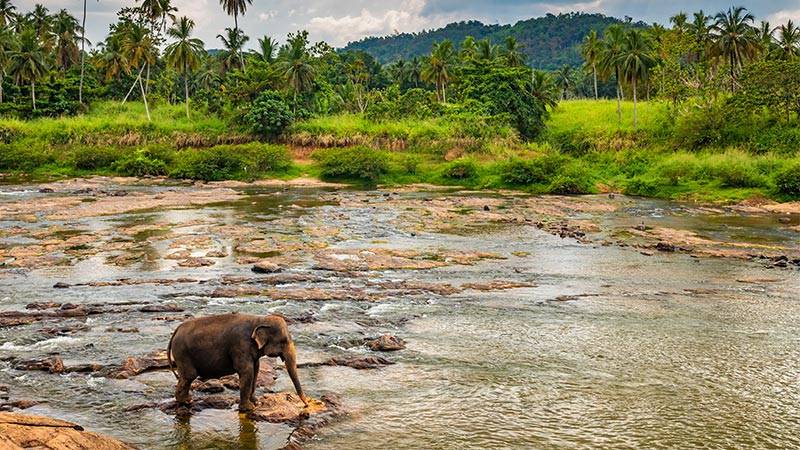As the global community grapples with the escalating threats of climate change, Sri Lanka is taking proactive steps to adapt and safeguard its vulnerable sectors and populations. The island nation, already equipped with risk management mechanisms, is exploring avenues to enhance these systems and bridge existing gaps.
Climate change has been identified as a significant risk factor for Sri Lanka, especially for susceptible sectors and groups. The country is currently bolstering its national environment policy concerning climate change. This includes engaging in global and international processes that could alleviate constraints and bolster risk management.
The 21st century has presented Sri Lanka with a multifaceted landscape of risks, including environmental degradation, biodiversity loss, and economic challenges. The Intergovernmental Panel on Climate Change’s (IPCC) Sixth Assessment Report underscores the urgency of the situation. It identifies South Asia as a “global hotspot of high human vulnerability” and emphasizes the disproportionate impact on low-income households.
Ranjith Punyawardena, chair of the National Steering Committee on Climate Change Adaptation, elaborates on the climatic challenges facing Sri Lanka. He highlights the variability of seasonal rainfall and the gradual rise in ambient temperatures as primary concerns. Extreme weather events, such as floods and landslides, pose significant threats to the nation’s populace. Vulnerable groups, including women, children, the elderly, and those with special needs, bear the brunt of these climatic adversities.
Kavindu Ediriweera, a climate policy specialist, underscores the impact of climate change on Sri Lanka’s youth, who constitute 24% of the population. Climate-induced risks can hinder their access to resources, leading to economic instability and challenges in education, food security, and health.
The agriculture sector, vital for Sri Lanka, is a focal point for climate risk management due to its inherent vulnerability. To safeguard vulnerable sectors and populations, risk management systems must evolve in tandem with the rapid progression of climate change. The IPCC report suggests that some sectors have already reached their adaptation limits, primarily due to financial and policy constraints.
Risk management encompasses a plethora of sector-specific tools, ranging from insurance to debt-for-climate swaps. These mechanisms hinge on risk awareness, literacy, and understanding. Punyawardena emphasizes the importance of weather advisories and early warnings, which bolster community preparedness against climate-induced risks.
In Sri Lanka, existing risk management mechanisms include, among others, a compulsory crop insurance scheme, a national natural disaster insurance scheme and a range of social protection systems. However, as Punyawardena points out, there is scope for enhancement: “The spatial resolution and lead time of forecasts and early warnings still need quantum improvement.”
Astrid Zwick, co-director of the Global Shield Secretariat, elaborates on mechanisms like parametric insurance, which offers swift financial support post-disaster. Such mechanisms aim to minimize the impacts of climatic events through immediate action.
According to Mongabay, Sri Lanka’s existing risk management tools include a mandatory crop insurance scheme and a national natural disaster insurance scheme. However, there’s room for improvement, especially in enhancing the precision of forecasts and early warnings.
To address the challenges of climate change, Sri Lanka is fortifying its national environment policy. This includes the introduction of a new Climate Act, a revised National Climate Change Policy, and updated Nationally Determined Contributions. The country’s Climate Prosperity Plan, unveiled at the U.N. Climate Change Conference in 2022, aims to bolster climate protection and promote risk-informed investment.
In the context of global negotiations, initiatives like the Global Shield against Climate Risks play a pivotal role. This partnership, comprising the Vulnerable Twenty and the Group of Seven, seeks to amplify action against climate-related risks.
Zwick emphasizes the importance of international collaborations like the Global Shield, which facilitates consultation processes and helps nations tap into global expertise.
Engaging all stakeholders is crucial for a comprehensive risk management framework. Ediriweera believes that the youth, representing a significant portion of the population, can play a pivotal role in fortifying the nation against climate risks.
Navigating the challenges ahead, Sri Lanka’s focus is on amalgamating various elements: fostering an enabling environment, forging partnerships, and mobilizing resources to create a robust framework that can help the nation navigate the tumultuous waters of climate change.
More inspiring green news similar to this:


